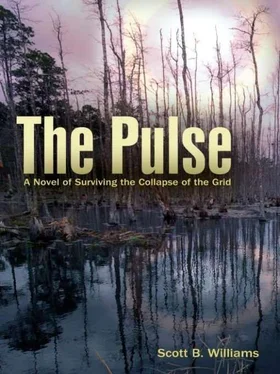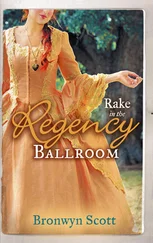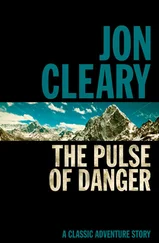“I’m okay, really. You said there was oatmeal.”
“Yeah, but only enough for today. After that, it’s gone, and we’re down to a few almonds and raisins.”
Grant put the pot on top of the tripod and collected a handful of pencil-sized dry twigs from dead branches still on the trees in the vicinity. He got the fire started and instructed Jessica to feed it with just a few twigs at a time while he went to the riverbank to clean the catfish. There wasn’t time to do it right, so rather than worry about trying to remove the tough skin typical of the species, he simply gutted it and cut off the head, then split it into two halves and washed these in the river. He was so hungry for meat he could have eaten them raw, but a kiss of the flames for a few minutes would make the fish much tastier and would be simple and quick enough. When the pot of water was boiling, he poured enough for Jessica’s oatmeal in her bowl, then added some ground coffee to the rest. Then he laid the fish halves over the flames.
“So, what made you decide to become a vegetarian? Casey told me you made that choice before she met you at Tulane.”
“Yeah, I had thought about it a lot since I was in about the seventh grade, I guess, when we learned in school how animals were treated in modern factory farming. The more I learned about it from reading on the Internet and all, the more I realized how cruel it really is to raise animals for meat. I decided to give up eating all chicken and beef and things like that first, then the more I got into the vegetarian lifestyle, the more I realized I didn’t even want fish or seafood, or any kind of animal foods that require killing the animal. I still eat cheese, and occasionally drink milk. I just don’t eat meat. It’s been four years now, and I feel fine.”
“Well, I can understand how the details of factory farming could be disturbing, but you do realize that humans have been eating meat as well as plant foods since the dawn of time, don’t you? The thing that bothers me about vegetarianism is that it implies we are somehow ‘above’ or ‘better than’ the other species, when in fact, we are animals too, and are subject to the laws of nature just like all species, despite our technology, which, as you can see, has failed us miserably now. Anyway, as an anthropology student, I find it a fascinating topic. I’m not trying to put you down or change your mind, I’m just trying to understand, that’s all.”
“I know most primitive people ate meat. But it’s just not necessary today. We don’t have to live that way because we have infinite choices available to us now.”
“ Had infinite choices,” Grant reminded her as he used his pocketknife to turn the two slabs of fish over in the flames. “Everything’s changed now. Getting all that variety of fruits, veggies, and grains delivered to your neighborhood grocery store is a thing of the past until the whole system gets rebuilt, as you are well aware by now. Regardless of that, we are presently in an environment not unlike that of our distant primal ancestors. I can assure you that I have learned through my extensive studies of the subject, and my time spent living among the Wapishana, who are among the few truly aboriginal people left in the world today, sustaining human life from plant food alone is extremely difficult, if not impossible, in the wilderness. I hope you can see the difference between eating this fish, caught from the wild in the river, compared to fattening up chickens or hogs on growth hormones in inhumane cages for slaughter. If I didn’t eat this fish, chances are a hungry alligator or a bigger fish would.”
“I can see your point. I’m not saying I’ll never eat it. I’d much sooner eat that than a rabbit or something. I just hope it doesn’t come to that.”
“I’m afraid that it will, Jessica. That’s my point. Our situation isn’t going to change, and I don’t want to see you get weak or sick as a result of clinging to an unsustainable lifestyle.” Grant lifted the fish off the flames and quickly put out the fire by kicking sand over the burning twigs. He poured them each a cup of coffee and squatted next to the canoe, where he began pulling chunks of half-cooked fish off the bones and skin with his fingers. It was the best meal he’d had since leaving New Orleans.
“It does smell good cooked,” Jessica said, as she ate the last bite of oatmeal. “I’m not saying I won’t eat fish, I’m just not ready today, okay?”
“I’ll tell you one thing I’m going to miss the most about civilization,” Grant said, “and that is coffee. What we have left will last three, maybe four days, and then we’ll be caffeine-free for good, unfortunately.”
With no tarp or tent to take down, breaking camp and getting back on the river took only minutes. The mist hanging over the water limited their visibility, so Grant took it easy and paddled as silently as possible, instructing Jessica how to do the same. He felt sure that they were still a good distance behind Casey and her abductor, but he didn’t want to take a chance. The sun would soon burn away the fog, and then they could focus on making up lost time.
As they paddled around the wide, looping bends of the river, they passed huge sand and gravel bars on almost all of the inside bends. Grant knew that this part of the Bogue Chitto was the site of extensive gravel mining, but that most of the operations were just out of sight of the river. Paddling this way before in normal times, he’d heard the sound of bulldozers and other machinery off in the distance almost constantly in the daylight hours. He knew all this must have shut down the first day after the lights went out, and didn’t expect to see anyone associated with that work out on the river. Other people that would use the sandbars before the solar flare occurred were recreational weekend canoeists and some of the local country folk who loved to ride four-wheeler ATVs across these wide beaches and through the shallows.
As they paddled by these wide beaches, Grant kept their course as close as possible to the edge of the sand, scanning for signs that the man who had Casey had stopped on any of them. Grant knew he had to stop sometime, if for no other reason than to get out of the canoe and relieve himself. Since it had been less than a full day after the heavy rains let up, Grant figured that it was unlikely anyone else had visited any of these sandbars, except for those that were near the occasional camps that were scattered along the river course here and there. Stopping at each one and getting out for a close examination would take far too long, but he surmised that if Casey’s abductor had indeed stopped, the evidence would be right at the water’s edge anyway, and his theory proved correct after they had been paddling about an hour or so.
“There!” he said, as he quickly dug his paddle in and did a correction stroke to turn the bow into shore.
“What is it, do you see them?” Jessica asked, as she scanned the river ahead, thinking Grant was looking that way.
“He stopped right here!” Grant said as he leapt out of the canoe and pulled it up for Jessica. As soon as she was out he warned her not to walk over the tracks and then he crouched down to see if he could make sense of them.
“Yep, it was him! Look, it’s the same footprints, those moccasins or whatever they are that he’s wearing. The tracks are identical to the ones on the sandbar where he took Casey. Now we know for sure he’s still ahead of us, somewhere on the river. See, there’s the mark he made when he pulled his canoe up, like I just did with ours.” Grant followed a straight line of the tracks off across the sandbar to where a lone, stunted cypress tree stood weathered and broken out in the open. “He walked over here to pee,” he called back to Jessica, then he went back to the canoe.
Читать дальше












